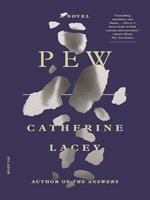WINNER of the 2021 NYPL Young Lions Fiction Award. Finalist for the 2021 Dylan Thomas Prize. Longlisted for the 2021 PEN/Jean Stein Book Award, the Andrew Carnegie Medal for Excellence in Fiction and the Joyce Carol Oates Prize. One of Publishers Weekly's Best Fiction Books of 2020. One of Amazon's 100 Best Books of 2020.
"The people of this community are stifling, and generous, cruel, earnest, needy, overconfident, fragile and repressive, which is to say that they are brilliantly rendered by their wise maker, Catherine Lacey." —Rachel Kushner, author of The Flamethrowers
A figure with no discernible identity appears in a small, religious town, throwing its inhabitants into a frenzy
In a small, unnamed town in the American South, a church congregation arrives for a service and finds a figure asleep on a pew. The person is genderless and racially ambiguous and refuses to speak. One family takes in the strange visitor and nicknames them Pew.
As the town spends the week preparing for a mysterious Forgiveness Festival, Pew is shuttled from one household to the next. The earnest and seemingly well-meaning townspeople see conflicting identities in Pew, and many confess their fears and secrets to them in one-sided conversations. Pew listens and observes while experiencing brief flashes of past lives or clues about their origin. As days pass, the void around Pew's presence begins to unnerve the community, whose generosity erodes into menace and suspicion. Yet by the time Pew's story reaches a shattering and unsettling climax at the Forgiveness Festival, the secret of who they really are—a devil or an angel or something else entirely—is dwarfed by even larger truths.
Pew, Catherine Lacey's third novel, is a foreboding, provocative, and amorphous fable about the world today: its contradictions, its flimsy morality, and the limits of judging others based on their appearance. With precision and restraint, one of our most beloved and boundary-pushing writers holds up a mirror to her characters' true selves, revealing something about forgiveness, perception, and the faulty tools society uses to categorize human complexity.
WINNER of the 2021 NYPL Young Lions Fiction Award. Finalist for the 2021 Dylan Thomas Prize. Longlisted for the 2021 PEN/Jean Stein Book Award, the Andrew Carnegie Medal for Excellence in Fiction and the Joyce Carol Oates Prize. One of Publishers Weekly's Best Fiction Books of 2020. One of Amazon's 100 Best Books of 2020.
"The people of this community are stifling, and generous, cruel, earnest, needy, overconfident, fragile and repressive, which is to say that they are brilliantly rendered by their wise maker, Catherine Lacey." —Rachel Kushner, author of The Flamethrowers
A figure with no discernible identity appears in a small, religious town, throwing its inhabitants into a frenzy
In a small, unnamed town in the American South, a church congregation arrives for a service and finds a figure asleep on a pew. The person is genderless and racially ambiguous and refuses to speak. One family takes in the strange visitor and nicknames them Pew.
As the town spends the week preparing for a mysterious Forgiveness Festival, Pew is shuttled from one household to the next. The earnest and seemingly well-meaning townspeople see conflicting identities in Pew, and many confess their fears and secrets to them in one-sided conversations. Pew listens and observes while experiencing brief flashes of past lives or clues about their origin. As days pass, the void around Pew's presence begins to unnerve the community, whose generosity erodes into menace and suspicion. Yet by the time Pew's story reaches a shattering and unsettling climax at the Forgiveness Festival, the secret of who they really are—a devil or an angel or something else entirely—is dwarfed by even larger truths.
Pew, Catherine Lacey's third novel, is a foreboding, provocative, and amorphous fable about the world today: its contradictions, its flimsy morality, and the limits of judging others based on their appearance. With precision and restraint, one of our most beloved and boundary-pushing writers holds up a mirror to her characters' true selves, revealing something about forgiveness, perception, and the faulty tools society uses to categorize human complexity.








